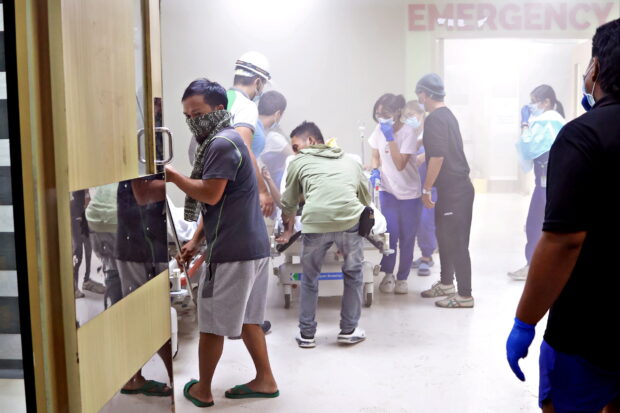
EVACUATION | Patients of Manuel J. Santos Hospital in Butuan City are evacuated to the street outside the hospital after a magnitude 7.4 earthquake caused a part of the hospital building to catch fire. (Photo by ERWIN MASCARIÑAS / Philippine Daily Inquirer)
MANILA, Philippines — One in 12 hospitals globally will be at high risk of shutdown from extreme weather by 2100 if fossil fuels are not phased out and emissions are high, according to a report by climate risk analysis organization XDI published on Saturday.
The study analyzed the vulnerability, particularly the physical damage to building structures, of more than 200,000 hospitals worldwide to six climate change hazards including flooding, forest fire, extreme wind, and coastal inundation.
Based on the report, the Philippines ranked 7th in terms of number of high-risk hospitals. Out of 2,057 hospitals analyzed, 550 or 26.7 percent are high-risk.
India, China, and Japan topped the list with the highest number of high-risk hospitals by 2100.
High-risk hospitals are those that have a high probability of total or partial shutdown within the design life of the building.
“If this was a residential or commercial building it would be considered uninsurable. In-depth analysis of risk to building advised to identify whether adaptation measures could reduce risk or if location unviable,” the report said.
PH particularly vulnerable
It noted that Southeast Asia, whose most dominant hazards include coastal inundation and flooding, had the highest percentage of hospitals at risk of damage from extreme weather events due to climate change.
“Analysis suggests that Southeast Asia has already experienced the greatest increase in risk of damage from climate change extreme weather: a 67-percent increase in risk of damage since 1990 (baseline year),” the study said.
The Philippines, along with Laos and Vietnam, are particularly vulnerable, the report said as they are low-middle income countries.
“Without a rapid reduction in emissions, by 2100, one in four or more of their hospitals will be unlikely to be able to withstand the type of severe weather events they will be exposed to,” it said.
If the greenhouse gas emissions remain high and fossil fuels are not phased out, a total of 16,245 hospitals globally will need to develop adaptation measures.
Limit global warming
“Even with this enormous investment, for many, relocation will be the only option,” the study said.
If global warming could be limited to 1.8 degrees Celsius on top of a rapid phase-out of fossil fuels, the report said the damage risk to hospital infrastructure could be decreased by 50 percent compared to a high-emission scenario.